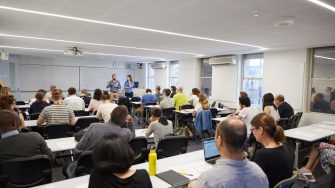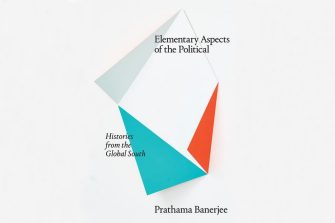
Societies around the world, and humanity at large, today face unprecedented challenges. From climate change to economic inequality, from war and political polarisation to the ingrained effects of colonisation and racism, the world faces a series of unfolding crises. In this context, academics, researchers, and intellectuals are called upon to provide insights and perspectives that can help to understand and address the present moment. At the same time, the humanities and social sciences traditions of critical inquiry are constantly called into question for the contribution they can make to the worlds we inhabit. What can critique do, as theoretical and practical intervention, to change things for the better today?
Upcoming Events
-
Critique Now is an interdisciplinary research group at the Faculty of Arts, Design & Architecture that investigates different forms of critical thought in the twenty-first century across the humanities, social sciences, and law. The group aims to generate and support interdisciplinary research that develops new modes of practising critique in the humanities and social sciences. It has a particular focus on collaborative work that engages postgraduate and early-career researchers working in these fields.
-
Coming from diverse disciplinary backgrounds, members of the group use philosophical, legal, social and historical methodologies to understand the global challenges posed by inequality, climate change, the ongoing impacts of colonialism, and contemporary modes of subjectivity.
Members:
- Ben Golder
- Heikki Ikäheimo (Co-Convenor)
- Kasia Jeżowska
- Daniel McLoughlin
- Timothy O’Leary (Co-Convenor)
- Melanie White
- Jessica Whyte (Co-Convenor)
Associate Members:
- Arcot Ananth
- Octaviano Arruda
- Max Hoddinott
- Minerva Inwald
- Siddharth Narrain
- Sonia Qadir
- Md. Abu Sayeed
- Shohini Sengupta
- Angela Smith
- Ashraf Uddin
- Ayesha Wijayalath
-
This interdisciplinary reading group gathers UNSW academics and postgraduate students interested in different forms of critical thought in the twenty-first century. We meet fortnightly in person on the Kensington campus. If you want to join, please contact Dr Jessica Whyte j.whyte@unsw.edu.au.
The reading list is decided collectively, and so far, it has included the following:
- Bernard E. Harcourt, Cooperation. A Political, Economic, and Social Theory (Columbia University Press, 2023)
- Pierre Charbonnier, Affluence and Freedom: An Environmental History of Political Ideas (John Wiley & Sons, 2021)
- Prathama Banerjee, Elementary Aspects of the Political: Histories from the Global South (Durham, NC: Duke University Press, 2020)
- Olúfẹ́mi O. Táíwò, Elite Capture: How the Powerful Took Over Identity Politics (And Everything Else) (Haymarket Books, 2022)
-
This is a series convened by Dr Ben Golder and open to PhD students affiliated with the Critique Network and working (broadly) in the field of critical theory. The group met latterly in person and now meets (for the foreseeable future) via Zoom to discuss and workshop the development of particular academic skills. Sessions are not dedicated to PhD-related skills development but rather to a broader set of academic skills – everything from writing a conference paper to fielding difficult questions in your conference panel through to how to do peer review and give constructive feedback. The idea behind the series is to reflect as a group about the best ways to do the kinds of quotidian academic tasks nobody ever seems to have taught us how to do. If you're interested in joining the group, please email Dr Ben Golder b.golder@unsw.edu.au.
-
- A Critique Now Book Forum, with Prathama Bannerjee, June 7 2023
- Distinguished Visitor, November 6-17 2023
Professor Bernard Harcourt of Columbia University, NY, will join the Group for a series of events, including a Public Lecture, Research Seminar, and Postgraduate Workshop.
More information coming soon.
- Distinguished Visitor, Alain Badiou, dates and details to be confirmed
-
What can critique mean for the humanities now?
24 February 2023With guest speakers Birgit Kaiser, Associate Professor of Comparative Literature and Transcultural Aesthetics, Utrecht University and Kathrin Thiele, Associate Professor of Gender Studies and Critical Theory, Department of Media and Culture Studies, Utrecht University.
This half-day workshop centred on the question of how we can develop critical methodologies in humanities and social sciences disciplines that effectively address our contemporary world.
You can read more about the event here.
Confronting Crisis
3rd Australian Hegel Society Conference
2-3 December 2021Humanity is facing multiple intertwined crises on a global scale: environmental disasters, biodiversity collapse, zoonotic pandemics, capitalist acceleration and monopolization, rising inequalities, increased control and manipulation at the hands of states and corporations, the list goes on. A hallmark of Hegelian and post-Hegelian social thought has been to elaborate conceptual tools to grasp the features, problems, and crises of an age, as well as the paths that could lead beyond them. The conference explored the resources that Hegelian and post-Hegelian philosophy provides to think through our current predicament and to confront the many crises we are facing.
Hosted by UNSW Sydney and Macquarie University. The programme of the conference is available here.
-
Federica Gregoratto, Heikki Ikäheimo, Emmanuel Renault, Arvi Särkelä, Italo Testa., ‘Critical Naturalism: A Manifesto’, Krisis | Journal for Contemporary Philosophy 42, no. 1 (8 December 2022): 108–24, https://doi.org/10.21827/krisis.42.1.38637.
O'Leary T; Thiele K; Kaiser BM, (eds.), 2022, The Ends of Critique: Methods, Institutions, Politics, Rowman & Littlefield, London.

